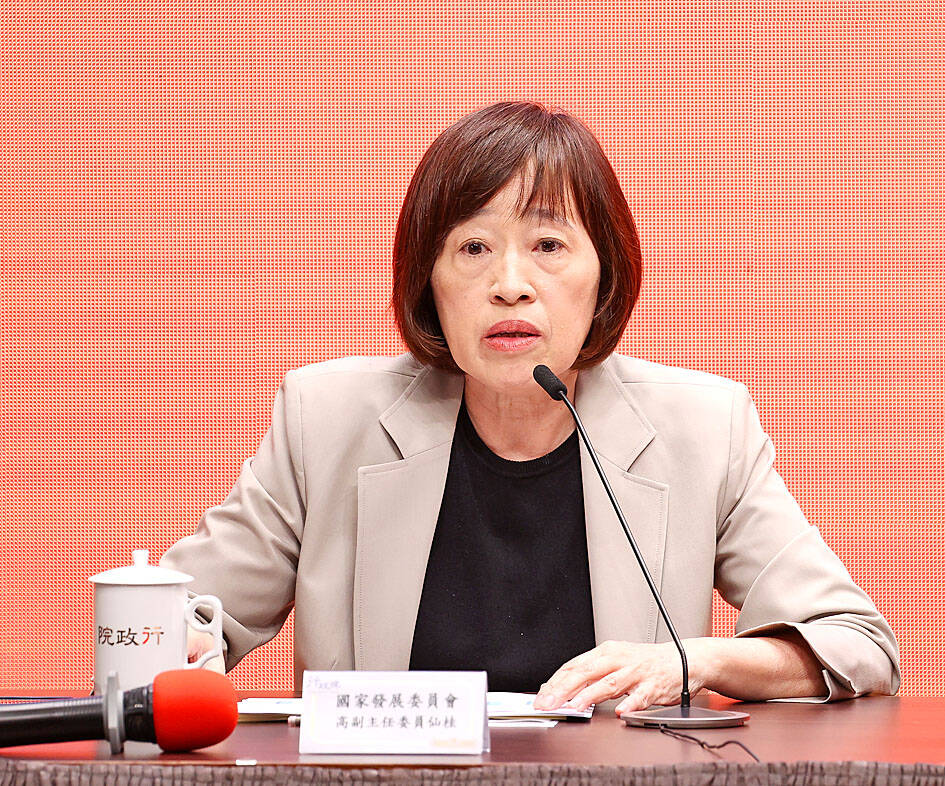Taiwan’s aim of a 3.5 percent GDP growth this year looks increasingly achievable, given that exports have been expanding for six months straight and are expected to gain better traction ahead, the National Development Council (NDC) said yesterday.
“The chance of meeting the target is picking up in light of improving exports and healthy domestic demand,” NDC Deputy Minister Kao Shien-quey (高仙桂) said.
Kao made the remarks during a media briefing after the first Cabinet meeting headed by Premier Cho Jung-tai (卓榮泰).

Photo: CNA
The council is looking at a GDP growth of 3.33 to 3.46 percent for this year, much faster than the 1.31 percent last year, the ministry’s report said.
The Directorate-General of Budget, Accounting and Statistics is to update its forecast on Thursday next week.
Exports in the first quarter expanded by 12.9 percent, substantially higher than the government’s predicted 8.36 percent increase in February.
Private consumption has remained sturdy two years after the lifting of COVID-19-related restrictions, the report said.
The council would coordinate with different government ministries and departments to realize the growth potential, NDC research director Wu Ming-huei (吳明蕙) said.
The impressive showings were due to insatiable demand from the US for electronics used in artificial intelligence (AI) infrastructure and applications, Wu added.
Nvidia Corp yesterday released record high quarterly revenue of US$26.0 billion, up by 18 percent from the previous quarter and 262 percent from a year ago.
Nvidia also posted record high quarterly data center revenue of US$22.6 billion, up 23 percent from three months earlier and 427 percent from a year ago.
Taiwanese tech firms supply advanced chips, high-end servers, storage and memory chips for the US-based technology giant.
While Taiwan’s tech sectors have benefitted from the AI boom, non-tech sectors have not yet come out of a business slowdown induced by stubborn global inflation, tight monetary practices and inventory gluts, Wu said.
The government would help struggling firms to boost competitiveness, diversify income resources and expand export markets, she said.
Wu added that the government would be pouring funds to shore up strategic semiconductor, AI, military industry, security monitoring and next-generation communications sectors.
Taiwan also has to cope with external challenges that would affect its pursuit of a 3.5 percent growth, such as the timing of interest rate cuts by major economies, potential economic slowdown in China and geopolitical tensions, Wu said.
The government has put in place price stabilizing measures in case of imported inflation and would introduce stimulus measures to invigorate tourism in eastern Taiwan, which had been hit hard by the April 3 earthquake, which measured 7.2 on the Richter scale, Wu said.

Intel Corp chief executive officer Lip-Bu Tan (陳立武) is expected to meet with Taiwanese suppliers next month in conjunction with the opening of the Computex Taipei trade show, supply chain sources said on Monday. The visit, the first for Tan to Taiwan since assuming his new post last month, would be aimed at enhancing Intel’s ties with suppliers in Taiwan as he attempts to help turn around the struggling US chipmaker, the sources said. Tan is to hold a banquet to celebrate Intel’s 40-year presence in Taiwan before Computex opens on May 20 and invite dozens of Taiwanese suppliers to exchange views

Application-specific integrated circuit designer Faraday Technology Corp (智原) yesterday said that although revenue this quarter would decline 30 percent from last quarter, it retained its full-year forecast of revenue growth of 100 percent. The company attributed the quarterly drop to a slowdown in customers’ production of chips using Faraday’s advanced packaging technology. The company is still confident about its revenue growth this year, given its strong “design-win” — or the projects it won to help customers design their chips, Faraday president Steve Wang (王國雍) told an online earnings conference. “The design-win this year is better than we expected. We believe we will win

Chizuko Kimura has become the first female sushi chef in the world to win a Michelin star, fulfilling a promise she made to her dying husband to continue his legacy. The 54-year-old Japanese chef regained the Michelin star her late husband, Shunei Kimura, won three years ago for their Sushi Shunei restaurant in Paris. For Shunei Kimura, the star was a dream come true. However, the joy was short-lived. He died from cancer just three months later in June 2022. He was 65. The following year, the restaurant in the heart of Montmartre lost its star rating. Chizuko Kimura insisted that the new star is still down

While China’s leaders use their economic and political might to fight US President Donald Trump’s trade war “to the end,” its army of social media soldiers are embarking on a more humorous campaign online. Trump’s tariff blitz has seen Washington and Beijing impose eye-watering duties on imports from the other, fanning a standoff between the economic superpowers that has sparked global recession fears and sent markets into a tailspin. Trump says his policy is a response to years of being “ripped off” by other countries and aims to bring manufacturing to the US, forcing companies to employ US workers. However, China’s online warriors